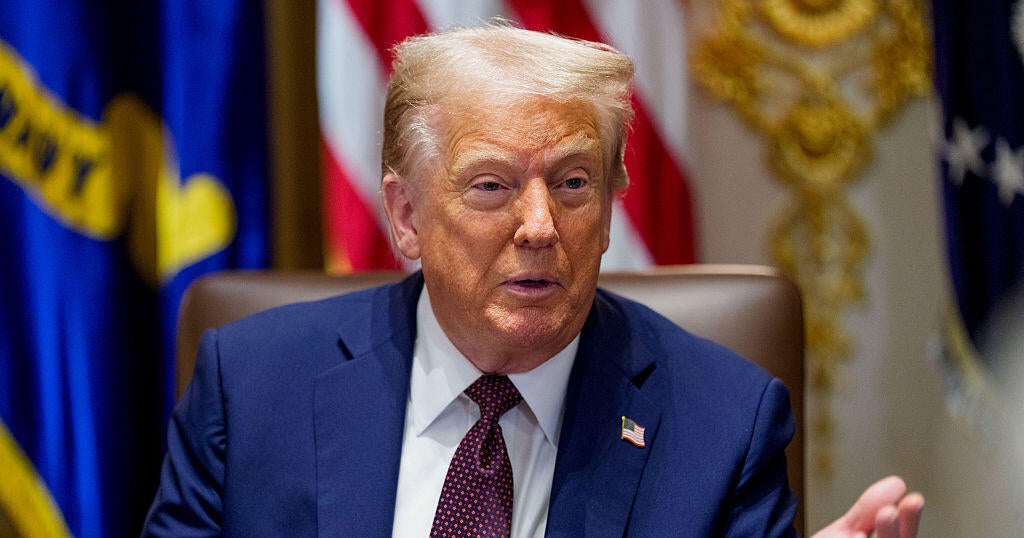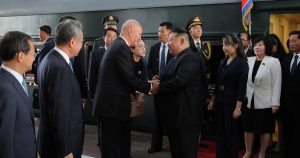Trump says he’s ended 6 or 7 wars. Here’s what the record shows.

In recent weeks, President Trump has repeatedly claimed he deserves credit for ending six or seven wars during his first months in office, arguing that he should receive the Nobel Peace Prize for his work.
“I stopped seven wars, and they were, they’re big ones too,” Mr. Trump said Friday.
“I’ve settled six wars, and a lot of people say seven because there’s one that nobody knows about,” he said in an August 19 interview.
A White House official provided a list of seven conflicts the president is referencing: Israel and Iran, Rwanda and Democratic Republic of the Congo, Armenia and Azerbaijan, Thailand and Cambodia, India and Pakistan, Egypt and Ethiopia, and Serbia and Kosovo.
“There has been more progress towards peace than ever before because of this President’s leadership,” the official wrote.
The recipient of the 2025 Nobel Peace prize is expected to be announced next month.
Over 100 people have received the award since the 19th-century chemist Alfred Nobel created the prize to honor a “person who shall have done the most or the best work for fraternity between nations, the abolition or reduction of standing armies and for the holding and promotion of peace congresses.”
Four U.S. presidents have been past laureates, most recently Barack Obama who received the prize for supporting nuclear nonproliferation and international diplomacy.
Foreign policy experts say that while Mr. Trump has helped broker ceasefires, including one between Israel and Iran, several of the foreign conflicts cited by the administration were not full-scale wars — and many remain unresolved. The White House did not respond to a request for clarification on why the president has repeatedly labeled all seven conflicts as settled wars.
Some of these peace efforts involved limited U.S. involvement, and in other instances, it remains unclear whether Mr. Trump’s role was decisive.
Here’s a look at the conflicts:
Israel and Iran
After Israel attacked Iran’s nuclear facilities in June, a 12-day conflict resulted in the deaths of about 28 Israelis and hundreds of Iranians before a ceasefire was reached with U.S. and Qatari involvement. Mr. Trump claimed credit, saying he had ordered U.S. airstrikes on Iran’s uranium enrichment sites and pressed Israel’s Prime Minister Benjamin Netanyahu to hold back from further strikes.
Michael O’Hanlon, a senior fellow at Brookings, said Mr. Trump deserves some credit for this ceasefire. “He managed to use a combination of a good relationship with Netanyahu, but also a willingness to put a little pressure on Netanyahu that I think contributed to the at least temporary cessation of hostilities,” O’Hanlon said.
But other foreign policy experts said tensions between the nations are far from resolved, and Pentagon spokesman Sean Parnell said in early July that the Defense Department estimated the U.S. strikes likely delayed Iran’s nuclear program by “one to two years.”
Larry Haas, a senior fellow at the American Foreign Policy Council said, “I very strongly disagree with the notion that the president brought peace to Iran and Israel. We may be in a quiet period in terms of direct confrontation, but Iran right now is trying to regroup.”
Rwanda and Democratic Republic of the Congo
In June, Rwanda and the Democratic Republic of Congo announced a peace deal after multiple days of talks in Washington mediated by President Trump and Qatar.
The deal aimed to end three decades of fighting over Congo’s mineral reserves. Yet the violence has continued, with both sides accusing each other of violating peace terms. Human Rights Watch reported that M23, an armed group that U.S. officials believe is backed by Rwanda, killed over 140 civilians in eastern Congo in July.
“It’s a premature declaration of success, when in fact we are just getting to the starting line,” O’Hanlon said.
Armenia and Azerbaijan
In August, Mr. Trump helped negotiate an agreement aimed at normalizing relations and reopening transportation routes between Armenia and Azerbaijan, which have spent decades fighting for control of the Karabakh region.
O’Hanlon and Haas agreed the Trump administration pushed the deal forward in part by inviting both leaders to the White House. Leaders of both countries also credited Mr. Trump for the agreement, saying he should receive the Nobel Peace Prize.
But the deal is not a formal peace agreement and requires ratification. One remaining sticking point is that Azerbaijan wants Armenia to remove any mention of territorial claims to Azerbaijan’s land from its constitution before officials sign a final deal. Armenia’s prime minister has expressed willingness to change the constitution but has not specified a date for a referendum.
Thailand and Cambodia
In late July, Thailand and Cambodia agreed to a ceasefire after an outbreak of fighting killed at least 35 people. President Trump said that he had pressured both sides to come to the table by threatening trade consequences.
The U.S. is a top importer for both counties, and foreign policy experts CBS News spoke to said Mr. Trump’s tariff threats played a significant role in securing a ceasefire. “He helped move things along with economic pressure,” Haas said.
The border dispute is continuing, though, with Thai officials accusing Cambodia of laying new landmines. Cambodia denied doing so.
India and Pakistan
India and Pakistan agreed to a ceasefire in May after weeks of cross-border missile and drone strikes. The deal ended the latest flare-up in their long-running dispute over Kashmir, which both nuclear-armed nations claim as their territory.
Pakistan credited the Trump administration’s efforts in U.S.-led talks, and nominated him for the Nobel Peace prize. But India insisted its own pressure on Pakistan, not U.S. diplomacy, drove the deal.
Josh Kurlantzick, a senior fellow for Southeast Asia and South Asia at the Council on Foreign Relations, said it’s a stretch to call the dispute over Kashmir settled.
“There is no real ending to this conflict,” he said, noting that future negotiations could be complicated by Mr. Trump’s decision to impose steep tariffs on India, a key partner.
Egypt and Ethiopia
Mr. Trump also claims he brokered peace between Ethiopia and Egypt, which have disagreed about Ethiopia’s decision to construct a hydroelectric dam in the Nile.
During his first term, Mr. Trump tried to broker a deal between the countries and suspended some aid to Ethiopia because of a lack of progress. In June, the president mentioned the dispute on Truth Social, writing, “There is peace, at least for now, because of my intervention, and it will stay that way!”
No deals have been announced, however. Ethiopia still plans to officially open its dam in September over Egypt’s objections that it will restrict the flow of water to its country. And while Egypt previously threatened to go to war over the dam, this conflict has remained a diplomatic one.
O’Hanlon said of the dispute, “I would not call the Egypt-Ethiopia interaction a war.”
Serbia and Kosovo
In 2020, President Trump helped negotiate a deal between Serbia and Kosovo to help normalize economic ties, but progress stalled afterwards.
Talks have continued with European leaders, but no breakthroughs have emerged. Kosovo declared its independence from Serbia in 2008, which Serbia still does not recognize.
“His deal-making, to the extent that it existed, actually occurred in his first term, and he really hasn’t stopped what’s going on,” Haas said.
Trump says he’s ended 6 or 7 wars. Here’s what the record shows.
#Trump #hes #ended #wars #Heres #record #shows





